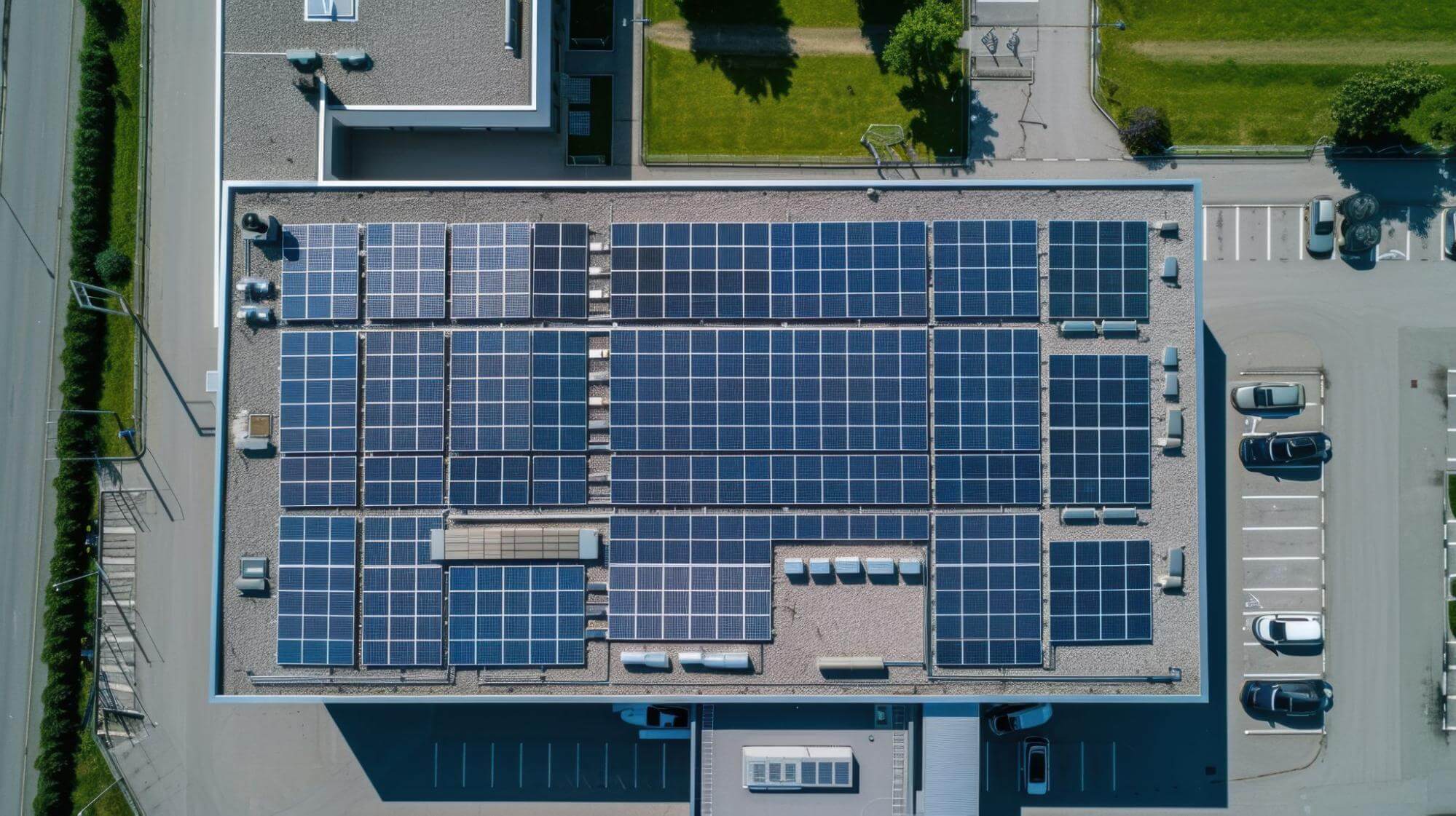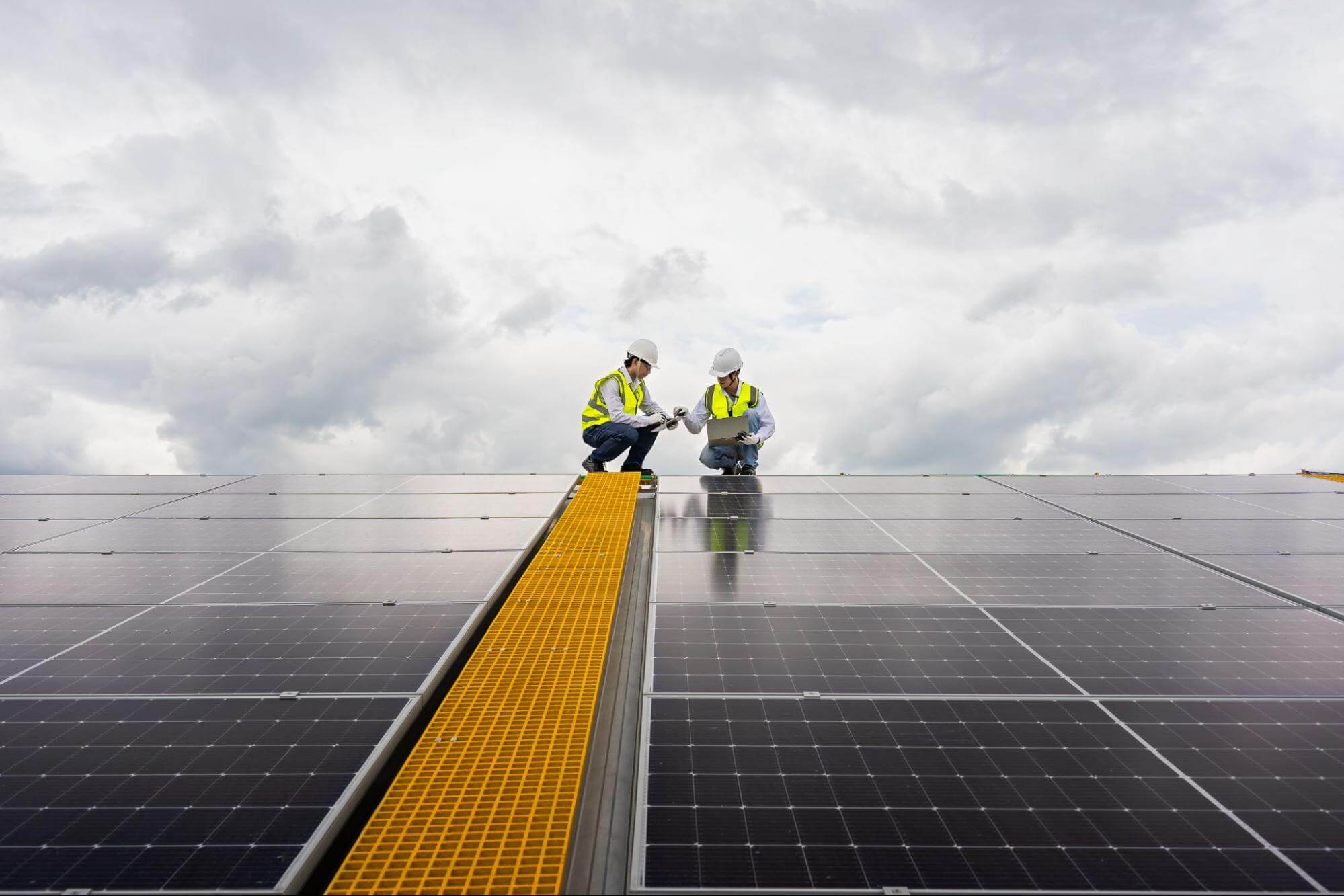Switching to solar energy isn’t just about going green — it’s a strategic investment for businesses looking to cut costs and boost sustainability. With commercial solar, organizations can harness renewable energy to power their operations, reduce their carbon footprint and unlock significant financial savings. In addition, various government incentives make the transition to solar even more attractive.
What is Commercial Solar for Business?
Businesses benefit from commercial solar by reducing energy costs, enhancing sustainability and integrating with advanced energy solutions like storage and EV charging, making it a comprehensive approach to energy management.
How do Commercial Solar Incentives Benefit Business
If your business is ready to explore solar, now is the time to take advantage of these opportunities and incentives:
- Cost Savings: Reduce or even eliminate monthly electricity bills, an operational cost which increases over time.
- Increased Property Value: Solar can increase the value of commercial properties on the market. By reducing operating costs, property owners can increase net operating income (NOI), a key factor in property valuation. Higher NOI can lead to a higher market value.
- Energy Independence: Protect against rising utility rates and power outages.
- Sustainability Leadership: Demonstrate environmental responsibility to customers, employees and stakeholders. Commercial solar can increase your company’s environmental, social and governance (ESG) score.
- Return on Investment (ROI): Solar installations can increase property value and generate long-term financial returns.
- Employee and Customer Appeal: Many employees and consumers prefer businesses that prioritize sustainability.
What Commercial Solar Incentives Exist for Property Owners
The Solar Investment Tax Credit (ITC)
The ITC was extended under the Inflation Reduction Act (IRA) of 2022, ensuring the 30% rate remains in effect for systems installed through 2032. After this period, the credit is set to gradually decrease unless further action is taken by Congress.
The ITC provides significant financial advantages to businesses investing in solar energy systems. By reducing the tax burden, it effectively lowers the upfront cost of installation, making solar projects more affordable. This reduction in costs helps businesses see faster returns on investment as the tax credit shortens payback periods. Additionally, businesses benefit from improved cash flow due to ongoing energy savings, allowing them to allocate funds to other priorities.
Over time, solar energy systems provide substantial cost savings while helping businesses meet sustainability goals and appeal to environmentally conscious customers or stakeholders. For businesses, the ITC is not just a tax incentive — it is a pathway to greater financial stability and environmental responsibility.
Additional ITC Bonus Credits
Businesses who qualify for the ITC may also qualify for additional bonus credits — including the domestic content bonus, energy community bonus and the low-income communities bonus. These bonus credits are offered to qualifying commercial projects that meet additional criteria.
The Domestic Content Bonus
This is an additional tax credit under the ITC for solar projects that use a specified percentage of components manufactured in the United States. To qualify for the domestic content bonus, commercial solar projects must include steel and iron products that are manufactured in the U.S. It incentivizes the use of domestically produced materials, potentially increasing the tax credit by 10%.
The Domestic Content Bonus
This bonus provides an additional 10% tax credit for solar projects located in designated “energy communities.” These areas include regions with economic reliance on fossil fuel industries or those experiencing high unemployment due to the transition away from fossil fuels.
The Low-Income Communities Bonus
This incentive offers an additional tax credit for solar projects that serve or benefit low-income communities. Depending on the project’s design and location, this bonus can increase the ITC by 10% or 20%, supporting equitable access to renewable energy.
The Modified Accelerated Cost Recovery System (MACRS)
Depreciation is the process of allocating the cost of a tangible asset over its useful life. It reflects the asset’s gradual reduction in value due to wear and tear, age or obsolescence. The Internal Revenue Service (IRS) offers guidelines for income tax deductions that allow businesses to recover the cost basis of certain properties — like commercial solar systems.
Under MACRS, businesses can deduct the depreciation of a solar energy system over a five-year period, rather than the longer depreciation schedules typically applied to other types of assets.
This accelerated schedule enables businesses to claim larger deductions sooner, which reduces taxable income and improves cash flow during the initial years of the solar investment. Additionally, the bonus depreciation provision, reinstated by the Tax Cuts and Jobs Act (TCJA) of 2017 and extended under subsequent legislation, allows businesses to deduct up to 40% of the project’s cost in the first year for systems installed in 2025. This will decrease to 20% in 2026 and will end in 2027, unless extended by Congress.
The USDA Rural Energy for America Program Grant for Small Businesses
The REAP Grant offers small businesses and agricultural producers funding for renewable energy projects, covering up to 40% of the total project cost through grants. Additionally, applicants can apply for loan guarantees covering up to 75% of the cost.
Eligible projects include solar panel installations, energy storage systems and efficiency upgrades. To qualify for the REAP Grant, individual borrowers must be U.S. citizens or permanent residents and private-entity borrowers must demonstrate that loan funds will remain in the U.S. The program is available to businesses located in rural areas, defined as locations with populations of 50,000 or less.
How do Commercial Solar Incentives Help Businesses

Commercial solar incentives help businesses reduce the upfront cost of solar installations, making the transition to renewable energy more affordable and financially viable. These incentives shorten payback periods, enhance return on investment and reduce energy costs over the long term. By combining federal tax credits, state incentives and grant programs, businesses can achieve significant savings while meeting sustainability goals. Adopting solar energy enhances a company’s reputation, appealing to eco-conscious customers and stakeholders. Overall, commercial solar incentives empower businesses to save money, improve profitability and contribute to a greener future.
Partner With Enact for Commercial Solar
Government incentives for commercial solar projects can significantly reduce upfront costs and accelerate your return on investment. Enact Solar simplifies the process, helping you take full advantage of these programs while turning your property into a high-performing asset.
Here’s How Enact Can Help You:
- Free Site Evaluation: Our experts assess your property’s solar potential at no cost, identifying how solar and energy storage can maximize your investment.
- Comprehensive Investment Review: We provide clear, data-driven pricing models and financial analyses that break down costs, savings, tax credits, rebates and ESG impacts, so you fully understand the financial advantages.
- Competitive Installer Bidding: For qualified projects, we manage a competitive bidding process through our platform to secure the best pricing and most qualified installers — helping you maximize incentive savings and minimize project costs.
- New Construction Solar & Storage Planning: We offer expert guidance in the early design phase to optimize solar integration and ensure your project qualifies for the latest incentives and rebates.
Claim Your Incentives and Start Saving
Partnering with Enact Solar gives you access to expert evaluations, custom solar designs and a network of trusted installers — all at no cost. Let us show you how solar can lower your operating costs and boost your property’s value. To get started, schedule a free consultation to start your free site evaluation and start saving.


